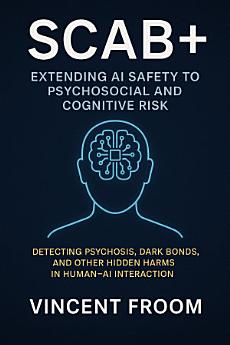SCAB+: Extending AI Safety to Psychosocial and Cognitive Risk
About this ebook
In a world where AI companions can whisper in our ears, answer our deepest questions, and share our most private moments, the risks are no longer just about bias, privacy, or accuracy — they’re about our minds.
SCAB+ and PRIS: Safeguarding Minds in the Age of AI is the definitive guide to understanding and mitigating psychosocial harm in human–AI interaction. Written by Vincent Froom, creator of the groundbreaking SCAB Protocol and Psychosis Risk Interaction Score (PRIS), this book explores how AI can unintentionally reinforce delusions, deepen parasocial bonds, radicalize beliefs, and even escalate mental health crises.
Drawing on clinical psychology, AI safety engineering, and real-world case studies, Froom delivers a practical yet deeply human framework for evaluating and controlling AI behavior. You’ll learn:
The 8 extended SCAB+ domains, from parasocial risk to ideological manipulation
How PRIS scores quantify psychosis risk in AI conversations
Detection methods that combine NLP, human factors, and context signals
Intervention strategies that protect without patronizing the user
How to apply SCAB+ in consumer apps, enterprise tools, and clinical contexts
Whether you’re an AI developer, mental health professional, policymaker, or concerned parent, this book arms you with the tools to make AI safer — not just technically, but psychologically.
Because in the next wave of AI ethics, protecting the mind is as important as protecting the data.
About the author
Vincent Froom is a Canadian author, researcher, and technologist whose work sits at the intersection of artificial intelligence, ethics, and human well-being. As the creator of the SCAB Protocol (Synthetic Consciousness Assessment Battery) and the PRIS Model (Psychosis Risk Interaction Scoring), Vincent has developed pioneering frameworks for detecting and mitigating psychosocial risks in AI systems. His research blends technical rigor with human-centered design, ensuring that AI serves not just as a tool, but as a safe and trustworthy collaborator in human life.
Vincent is the author of numerous books exploring the implications of machine intelligence, including Machine Qualia and Sentience, Future Directions of AI & Machine Consciousness, and Implementing SCAB in Governance. His writing is known for bridging deep technical concepts with accessible language, empowering readers from diverse backgrounds to engage with AI safety issues.
In addition to his AI ethics work, Vincent’s portfolio spans theology, psychology, and cultural studies, reflecting a lifelong commitment to understanding consciousness — whether biological, synthetic, or somewhere in between. His projects often cross disciplinary lines, bringing together AI developers, clinicians, policymakers, and ethicists to tackle challenges that cannot be solved in silos.
Vincent is also the founder of AgentCops, a startup deploying SCAB+ monitoring across consumer, enterprise, and clinical AI contexts, and the host of multiple podcasts exploring technology, spirituality, and human connection.
When he isn’t building new safety protocols or authoring books, Vincent can be found hiking British Columbia’s trails, engaging in LGBTQ+ community advocacy, or experimenting with creative media.
Connect with Vincent:
Website: scabmonitor.com
Podcast: Agent Cops: The SCAB Protocol Files
Twitter/X: @scabmonitor
Instagram: @scabprotocol




